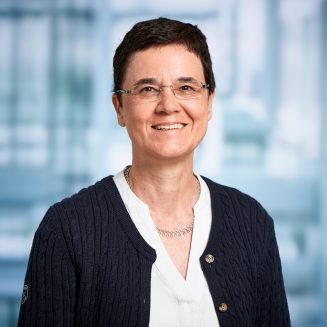
Dementia: definition, progression and prevention
What is dementia? What different types are there? What are the signs, and is there a cure? Find out more about the different types of dementia such as frontotemporal dementia and vascular dementia, and where you or your family members can get help.
What is dementia?
“Dementia” refers to a group of conditions that affect the brain. It causes a person’s mental faculties to gradually decline. The general signs of dementia include memory problems, changes in behaviour, and difficulty carrying out everyday tasks. There are currently 156,900 people living with dementia in Switzerland, and 33,800 new cases are recorded every year. The biggest risk factor for dementia is age. Around 95% of sufferers are aged 65 or older.
Primary and secondary dementia
Specialists differentiate between primary and secondary dementia, which have different causes. The cause of primary dementia lies in the brain itself. This form of the disease includes neurodegenerative and vascular dementia.
- Neurodegenerative dementia is when nerve cells in the brain die. Examples of neurodegenerative dementia include Alzheimer’s disease dementia, frontotemporal dementia, Lewy body dementia and Parkinson’s disease dementia.
- Vascular dementia is typically caused by disruptions in the supply of blood to the nerve cells in the brain. This form of dementia includes multi-infarct dementia and a condition known as Binswanger’s disease.
There is currently no cure for primary dementia, but if it is diagnosed at an early stage, it is possible to slow the progress of the condition.
Secondary dementia is caused by other conditions, such as traumatic brain injuries, certain chronic infectious diseases, autoimmune diseases, brain tumours, metabolic disorders and hormonal conditions such as hypothyroidism. It can also be triggered by the excessive consumption of alcohol. Unlike primary dementia, secondary dementia can be cured if it is spotted by a doctor at an early stage. It is important to identify and treat the cause of the dementia.
Types of dementia: an overview
In the following, we provide an overview of the symptoms and progression of different types of dementia, as well as sufferers’ life expectancy.
Alzheimer’s disease dementia
Alzheimer’s disease dementia is the most common form of dementia. It is triggered by a build-up of proteins in and around brain cells, which causes them to die. The symptoms of Alzheimer’s disease dementia include:
- Memory problems
- Irritability and low mood
- Sleep disorders
- Loss of appetite, and eating disorders
- Reduced capacity for learning
|
|
|
|---|---|
|
|
|
|
|
|
|
|
|
|
|
|
Stage
Symptoms
1. Mild cognitive impairment
Mild cognitive impairment, with no difficulties in day-to-day life
2. Early-stage Alzheimer’s disease dementia
Disruptions to short-term memory and spatial/temporal orientation, mood swings
3. Middle-stage Alzheimer’s disease dementia
Impact on long-term memory, agitation and nervousness, disorientation
4. Late-stage Alzheimer’s disease dementia
Dependence on care, difficulty talking, swallowing and chewing
Sufferers of Alzheimer’s disease dementia transition seamlessly from one stage to the next. Once a medical professional has identified the disease, the sufferer’s average remaining life expectancy is between six and ten years.
Please note that Alzheimer’s disease dementia always starts with the first stage – mild cognitive impairment. However, mild cognitive impairment does not always result in Alzheimer’s disease dementia.
The difference between dementia and Alzheimer’s disease
What is the difference between Alzheimer’s disease and dementia? “Dementia” is an umbrella term for a number of different conditions that affect the brain. “Alzheimer’s disease” is a specific form of dementia. Alzheimer’s disease dementia is very common. Around 66% of all dementia patients have Alzheimer’s disease.
Frontotemporal dementia
In cases of frontotemporal dementia, the nerve cells of the brain near the forehead and temples die off. This part of the brain is in charge of social behaviour and emotions. The condition most commonly affects people aged between 50 and 60, and is rare in younger people. The symptoms of frontotemporal dementia are as follows:
- Personality changes
- Changed social behaviour
- Irritability, disinhibition, listlessness
- Speech impairments, for example, when trying to find words
- Memory problems
Specialists differentiate between two different forms of frontotemporal dementia. The behavioural variant causes changes in personality and behaviour. Sufferers of primary progressive aphasia, on the other hand, have difficulty talking and understanding speech. For both variants, frontotemporal dementia progresses through three stages:
- Initial stage: The first signs of frontotemporal dementia are unusual behaviour or language problems, depending on which form the person is suffering from. Despite these symptoms, they are able to manage everyday tasks.
- Advanced stage: The symptoms of the other variant occur during this stage. This means that sufferers of the behavioural variant also experience language difficulties, and vice versa.
- End stage: The symptoms of this stage are similar to those of Alzheimer’s disease dementia.
The life expectancy for sufferers of frontotemporal dementia is about eight years from diagnosis.
Vascular dementia
Vascular dementia has a number of different causes, with common ones including strokes, damage to blood vessels or brain haemorrhages. The typical signs of vascular dementia are:
- Problems concentrating
- Impaired motion, for example, when walking
- Loss of bladder control
- Changes in behaviour
The progression of vascular dementia depends on its cause, and varies significantly. If it was caused by a stroke the symptoms occur abruptly, but in other cases, they appear gradually. Stages in which the symptoms remain stable are typical for vascular dementia. After being diagnosed with vascular dementia, people have an average life expectancy of five years.
Lewy body dementia
Lewy body dementia is caused by a build-up of protein deposits in the nerve cells of the cerebral cortex. It occurs either by itself or in connection with Parkinson’s disease. The symptoms of Lewy body dementia are:
- Visual hallucinations
- Problems with motion, such as shaking or stiff muscles
- Sleep disorders
- Changes in behaviour
- Attention disorders
- Physical symptoms such as depression, listlessness or brief losses of consciousness
The memory still works well in the early days of Lewy body dementia. At this stage, sufferers mainly experience limitations in their daily lives. They struggle to organise their days, and many of them lack motivation. As the disease progresses, symptoms such as incontinence and problems swallowing are also experienced. Sufferers of Lewy body dementia can expect to live between six and twelve years from the onset of the first symptoms.
Parkinson’s disease dementia
In cases of Parkinson’s disease dementia, the nerve cells in the substantia nigra of the brain are lost due to protein deposits. Parkinson’s disease dementia does not usually occur until many years after the motor-related symptoms of Parkinson’s disease first appear. The signs of Parkinson’s disease dementia are:
- Problems concentrating
- Slow thought processes
- Slow reactions
- Difficulty finding words
- Loss of motivation
- Visual hallucinations and delusions
- Personality changes
Unlike with Alzheimer’s disease dementia, people with Parkinson’s disease dementia have almost no problems with their memory in the early stages of the disease. The main symptoms of this form of dementia are slow thought processes and difficulty concentrating. The capacity to learn, however, is not affected. Personality changes and hallucinations develop as the disease progresses. Later on, sufferers become more and more dependent on support, and ultimately require care. The average life expectancy after diagnosis is five years.
The difference between Parkinson’s disease and dementia
Around 30% to 40% of Parkinson’s sufferers are affected by Parkinson’s disease dementia. Parkinson’s disease is already at an advanced stage when it is diagnosed. Its symptoms are motor-related: slowed movements, shaking, stiff muscles and problems with balance. Parkinson’s disease dementia is a non-motor-related symptom of Parkinson’s disease.
Preventing dementia
The risk of dementia increases with age. But there are a number of ways that you can reduce your risk of dementia.
- Make sure that you are getting a healthy and balanced diet. This will provide your brain with all of the important nutrients that it needs, and reduce your risk of developing dementia. Eat plenty of fruit, vegetables and nuts, and avoid ready meals, red meat and sugar if possible.
- Challenge your brain. Using your brain trains it, and we retain this ability into our old age. You should therefore read regularly, play challenging games, and keep learning new things (such as languages).
- Stay physically active. Regular exercise increases the supply of blood to your brain, and also protects against cardiovascular diseases.
- Get regular medical checkups to spot conditions that could lead to dementia in good time. You will also learn what you can do to maintain a healthy lifestyle.
- Social contact will keep your brain healthy. Maintain an active social life and avoid being lonely in your old age at the same time.
Risk factors for dementia: can dementia be inherited?
A genetic predisposition is one possible cause of dementia. However, researchers believe that only about 5% of all dementia cases can be attributed to genetics. So genes are just one risk factor for dementia out of many. The biggest risk factor is age. Our genes and our age are the two risk factors for dementia that we are unable to change. But there are many that we can influence, such as an unhealthy lifestyle, high blood pressure, being very overweight, diabetes, excessive alcohol consumption and sleep disorders.
Wie wird Demenz diagnostiziert?
If someone notices the early symptoms of dementia, in themselves or in someone close to them, the first step is usually to talk to their GP about their suspicions. The GP refers them to a neurological practice or competence centre for dementia. The neurological assessment comprises a number of different tests for dementia, including the following:
- Clock-drawing test: the medical specialist conducting the assessment asks the patient to draw a clock face. An assessment is made of whether the patient has early-stage or advanced dementia based on their behaviour and the resulting drawing.
- Mini-mental state examination: the specialist asks questions about the time and location, and assigns the patient tasks to assess their attention, calculation and writing skills.
- Lumbar puncture: if Alzheimer’s disease dementia is suspected, the medical specialist will perform a lumbar puncture. This involves extracting cerebrospinal fluid from the spinal canal in your lower back.
- Imaging procedures: magnetic resonance imaging and computed tomography provide information on diseases of the brain and nervous system.
Dementia: treatment
How dementia is treated depends on what form it takes. A number of different measures are recommended for primary dementia, including:
- Drugs such as anti-dementia agents, antipsychotics and antidepressants
- Occupational therapy
- Physiotherapy
- Behavioural therapy
- Cognitive training
How we support dementia sufferers
Compulsory basic insurance covers all of the costs for the diagnosis and treatment of dementia by medical specialists. It also reimburses the costs of certain alternative treatment methods provided they are administered by a qualified doctor. Our SANA and COMPLETA supplementary insurance plans cover more alternative treatment methods and preventive measures.
Take the signs of dementia seriously
Take problems with your memory seriously. The earlier treatment starts, the more favourable the outcome will be – for both patients and their families.
Sufferers and their family members can get valuable information and support from our brochure on dementia and from specialist organisations. These include:
Do you think you may have dementia? Don’t hesitate to seek help. Take action if a family member has dementia or starts to exhibit the early symptoms of dementia. An early diagnosis can have a positive impact on the progression of the disease.

The specialist provided the editorial team with advice and input for this article. Cécile Rohrer Kaiser (Master of Public Health, University of Zurich) works for the Helsana health consultation service. She helps customers on issues to do with prevention and health promotion.



Newsletter
Find out more about current health issues every month and get all the information you need about our attractive offers from all Helsana Group companies * delivered by e-mail to read whenever it suits you. Our newsletter is free of charge and you can sign up here:
We did not receive your information. Please try again later.
* The Helsana Group comprises Helsana Insurance Company Ltd, Helsana Supplementary Insurances Ltd and Helsana Accidents Ltd.